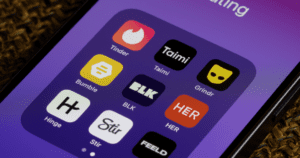There are many things that people are concerned about when it comes to the safety of online dating. While many people understandably focus on issues like physical safety and preventing being scammed, there is another area that does not get as much attention but is critically important – information privacy. A recent study looked into this issue with some informative findings.
Assessment of Personal Data Sharing by Dating Apps
The study in question was conducted by Money Transfers, a website that has previously produced guidance about information security online. This particular study sought to assess whether or not each of the 15 different dating apps sold or shared user information in 14 different categories.
For some users, dating app statistics on data privacy may not seem very important at first thought. However, think about the many different things you share about yourself when constructing a profile. This includes your name, age, sexual orientation, interests, and often things like your employer or educational institutions.
Additionally, there are many types of data that dating apps have access to in order to operate. This includes very specific information about your location. Apps can also potentially access things like your contacts, browsing history, and purchases. Thus, dating app statistics about how apps use your data are important to understand.
The Best & Worst Dating Apps for Information Sharing
In evaluating the results of this study, there are several things to consider. First, let’s begin with the good news. It would appear that five of the dating apps studied do not share any user data with third parties. These include Hinge, Raya, Flava, Once, and Thursday. Of course, seeing Hinge on this list is likely a positive for many people as it is the third most popular app in the U.S. and the fourth most popular globally.
Of course, there were also several apps that shared lots of user data, providing significant concerns for user privacy. Badoo and Her were at the top of the list with each sharing five different types of data with third parties. Both shared location, contact info, identity, and usage data. Badoo also shared miscellaneous other data while Her also shared information about purchases.
Grindr, OKCupid, and eharmony rounded out the dating app statistics for the five worst offenders of sharing personal data. All three of these apps shared identities and usage data. Additionally, Grindr shared diagnostic information, OKCupid shared location data, and eharmony shared purchases. Tinder and Plenty of Fish – the first and fourth ranked apps in U.S. market share – each shared two types of data. Meanwhile, the second most popular app Bumble only shared some miscellaneous data.
What These Dating App Statistics Mean for Users
What are the most important takeaways from this study? First, it shows what many likely expected – the majority of dating apps share user personal information with third parties. In fact, two out of three apps included in this study did so, meaning that at least some of your personal information is more than likely being provided to others.
Additionally, these dating app statistics can help us to better evaluate the apps that we use in order to protect data that we want to stay private. For example, if you have concerns about your location data, it is good to know that five apps – Badoo, her, OKCupid, Tinder, and Plenty of Fish – share that data with others. Meanwhile, if you don’t want your identity disclosed to third parties, there are seven apps that you will want to consider avoiding.
Knowing what types of data are shared with third parties is important for helping empower dating app users to better make decisions about the privacy of their data. Of course, it is also important to note that usage of data changes over time. Any time an app updates its privacy practices, it should trigger the thought that they may have changed what and how data is shared with others.
When user personal information is shared by dating apps, it is deidentified to protect user identities. However, there is always the potential that data could be sifted through to determine who the user is, particularly when location-based data is part of what is being shared. Users who care about their privacy will want to better understand how their apps utilize their data.
Ultimately, if you are someone who wants to exert the highest degree of control over your personal information, these dating app statistics show that Hinge, Raya, Thursday, Flava, and Once may be the best way to go as these are the only five of the apps surveyed that do not currently share any user information with third parties.



